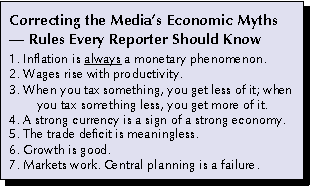 |
|||||||||
|
 |
||
|
 |
||||||||||||||||||||||||
|
||||||||||||||||||||||||
 |
||||||
|
||||||
 |
||||||
|
 |
||||||||||||||||||
|
||||||||||||||||||
 |
||||||||||||||||||||||||
|
||||||||||||||||||||||||
 |
||||||||||||||||||
|
||||||||||||||||||
|
|
|
For Immediate Release: Katie Wright (703) 683-5004 - Wednesday, January 2, 2002

Ten Economic Leaders Offer an Alternative to Bias in a New Book from MRC's Free Market Project Combating the Media's Economic Myths The question from Julie Chen was meant to be serious. It was January 3, 2001, and the news anchor for CBS's Early Show had just learned that, as an alternative to raising prices, some snack food companies were shrinking the size of their packages: "So, I'm getting less chips, paying the same amount of money. Is that legal for them to do this?"
Journalistic ignorance of how the free market works isn't isolated to one reporter or one network. It is an ongoing problem that results in biased and hostile coverage of our strong private economy, as the MRC's Free Market Project has thoroughly documented. Too many reporters apparently regard government intervention as the solution to a wide variety of perceived ills, not a clumsy tool of last resort. After a roller coaster accident in July, ABC's Elizabeth Vargas reflexively reported: "More trouble at the nation's amusement parks, two dozen people injured. Why won't Congress let the government regulate those parks?"
Collaborating with economist Stephen Moore, a scholar with the Cato Institute and President of the Club for Growth, the MRC has published a short but powerful new book which offers journalists a primer in free market economics. Crammed with facts, charts and useful stats, it's called Dollars & Nonsense: Correcting the News Media's Top Economic Myths, and it's available at
www.mrc.org (select the button which says "Buy and Subscribe" on the left side of the home page). Here's a preview: -- Exposing the Stimulus Fantasy: Many government programs at the federal level are intended to create jobs and increase American competitiveness. This is often a fiscal illusion. The ability of fiscal policy - particularly government spending - to 'stimulate' the economy is a very questionable theory and is often counterproductive in practice, as Nobel prize-winning economist Milton Friedman proves in Chapter 1. -- Debunking the Phillips Curve: In spite of the current recession, in real terms our economy has grown by almost 90 percent during the past 20 years. The GDP has averaged a torrid 3.5 percent annual growth rate. We have created some 40 million new jobs, incomes are rising, and inflation is almost nonexistent. Yet in the face of this revolutionary progress, the media stubbornly cling to old-economy theories such as the Phillips Curve notion that economic growth causes inflation. As Lawrence Kudlow shows in Chapter 2, these data undermine Phillips Curve theorists who would restrain growth for fear that a "hot" economy would "ignite" damaging inflation. -- Countering the Myth of "Costly" Tax Cuts: If we accept the premise that people work, save and invest to earn money, then it stands to reason that increasing the rewards of working, saving and investing will lead to more of it, while taxing away those rewards will lead to less of it. In Chapter 3, Arthur Laffer and Steve Moore show that the U.S. government collected more, not less, revenue after all three of the 20th century's biggest tax cuts. -- The Good News About Trade Deficits: Since the early Reagan years, the U.S. has attracted more than $1.5 trillion in net foreign capital, an investment surplus that has been an engine for economic growth during the past two decades. That's the flip side of the expanding "trade deficit" about which media commentators routinely worry; in Chapter 4, Brian Wesbury explains that the trade deficit is actually a signal that we are winning the global race for investment capital. Other essays assure us that our planet isn't running out of resources, deregulation is good for consumers, and the middle class isn't shrinking. For audiences who have been steeped in the mass media's pessimism for years, these experts offer welcome insight into the way America's free economy really works. -- Rich Noyes
Home | News Division
| Bozell Columns | CyberAlerts |









